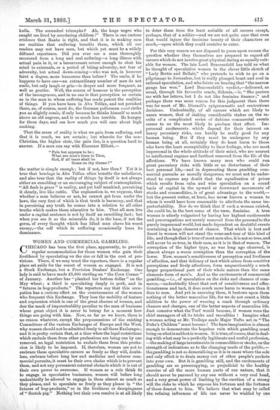"ABU TELFAN."
IT is not often that much teaching is to be obtained by Englishmen out of translated German novels. There is amusement in Preytag's books, principally derivable from the contrast of English and German manners ; and we all acknow- ledge the charm of Werner's scene-painter style—hardly any Englishman wields so broad a brush — but Spielhagen's strength is mainly nntranslateable humour, and the teach- ing in all is very slight. We stumbled the other day, however, on a German novel with wisdom in it. Any- body who happens to be very miserable, and especially any- body who is miserable from the feeling that his life has become for the moment a prison, in which unfavourable circumstances are crushing down energy and naturalness, and even hope—and who among us is so fortunate as never to feel thus, if it be but for moments at a time P—may, we think, read with advantage "Abu Telfan" by Herr Raabe, trans- lated by Madame or Mademoiselle Sofle Delffs. The translation is not perfect, from incomplete mastery rather of English than of German, and the writer's slightly bitter humour may not strike others as strongly as it struck ourselves, with the odd sense of pleasure one derives from entirely new and piquant food, of which one does not want to eat much; but the reader who goes on steadily will, we feel confident, come to one conclusion. He is somehow a little stronger for that book. We are not going to review it, for the original was published in 1867, but its central figure is a German loafer, half mauvais sujet, who, finding home intolerable, enters the service of the Engineers who first reported on the Suez Canal, wanders southward up the Nile, is carried by a negro tribe to a village of Darfur named Abu Telfan, and is kept in slavery for ten years. Nothing is described of his slavery, except that it was cruel, endless labour in insufferable heat, his mistress, a fat old negress, using the whip incessantly; but at the end of the time Hagebucher was bought, out of pity, by a German dealer in beasts for menageries, and sent home. His adventures when be arrives at home, with his character modified by his suffering, make the book, which is well written and readable, but not specially notable, except for sly sarcasm, and for the main thought, which, though not obtruded, is made with really admirable subtlety to pervade every page of it,—the thought that Abu Telfan, instead of destroying, made Hagebucher. The man has been baked, like bread which was dough. In that utter misery, a specially constricting and confining misery, endless labour under a blazing sun, with the whip for thanks, and more labour and more whip and less strength for future, with the brain unfed and cheerfulness impossible, and the -whole nature seem- ing to its possessor crushed, and dwarfed, and insensible to aught bat pain, the soul had gathered strength and calm. Not from religion. The author, we should fancy, believes little, and does not bring that little forward ; but Hagebucher in his slavery has reached the bottom, has touched the realities of things, and has thenceforward the benefit of a stoicism which is liker Christian resignation or the Quaker quietness than any stoicism—to be, after all, mainly stoicism, and not something higher—that we ever saw portrayed. Naturally, what is per- sonal suffering, or mental depression, or spoiled hopes, or any misery of life, even that great one of seeing wrong triumph- ant, when one has been German engineer and slave for ten years in Darfur, without hope of escape, under the whip of Kulla-kulla P But the difficulty is to get the benefit of that exemption, and this Hagebucher, not through reflection or any panacea, but simply by unconscious endurance and a certain manliness, has done. The dough is not reflective in the oven, but it becomes bread. (By the way, there must be a moment
when it was dough and is bread, though people say conversion is a lie.) And Herr Raabe, though he does not preach ever, and sometimes leaves the oddest impression of not quite seeing his own wisdom, clearly thinks that every man, especially, be it noted, for Raabe is essentially satirist, every German who is not well off, well liked by the police, and utterly Philistine, passes through his own Abu Telfan, be the same external or internal, his slavery sometimes lasting years, and might, if it were in him, profit thereby, and come out of bondage more of a man, not to say hero, than he went in. "We have all heard that before," do you say P "from nurses and mothers and preachers, and it is only the old story that trials are sent for our good, and is horribly irritating." Not exactly, though we may have sufficiently failed, from want of art, to leave that impression. There is no preachiuess in Herr Raabe, and he does not think trials for our good, but for our bad,—very detestable things, to be eschewed and escaped, whenever that is honourably possible. But they come, and his notion is that when they come, and especially when they come in the form he most detests, namely, actual bondage—bondage, he hints, as of Germans under their princely regime—or spiritual bondage, there may be, for some well-tempered natures, in the bondage itself, in its strong constriction and compression, its blasting effect upon all that is unreal, an annealing force that makes the soul strong enough not only to endure, but to comprehend in enduring,—a much higher level of being. It is the Christian teaching in away, but not from the Christian stand-point, and will address minds, if we have judged the book aright, on which Christianity, or, at all events, the Christianity taught in pulpits, has lost its capacity to bite.
We are not saying that the teaching is valuable to all. Souls are not cucumbers, to be all quickened alike by heat; nor is suf- fering good for all,—the irritating mistake preachers are apt to make. There are some men, and more women, so happily organised that expansion comes to them, as to most flowers, from the sunshine, and there are others whom hot suffering shrivels up or withers. Their souls die out in it, as a fire does in the afternoon rays. One-half our common people, if too miserable, are driven into drink, which then, at all events, benefits no one. They drink from drouth of happiness, not drouth of throat. But there are others to whom suffering, even when presented in that horrid form of bondage, slavery to detested or unacceptable conditions, to chronic ill-health, say, or to a loathed kind of work, or to a conviction which yet some- how you have lost and do not quite know you have lost, is a strengthening force. The man comes out of it more strong, more tolerant more refined, with the refinement which is not outside polish, but a change of nature. That last effect has been noted for ages, we suppose because refinement shows at all times, instead of occasionally ; but the others are true, too, and how, setting Christianity apart as we are doing all through this paper, do they come P A Hindoo or a disbeliever benefits also sometimes from residence in Abu Telfan, and how does that happen P A man's courage can hardly be increased by bondage—Kingsley used to say it was the one condition which cowed the brave—and certainly slaves acquire a notable and artificial timidity of their lords. Nor can bondage which in- volves the non-use of powers increase them as use does. Cheer- fulness increases force, and misery, even when it is past, can hardly increase cheerfulness, though the contrast may make us see causes for indulging the dwindled power which we never saw before. Is not Raabe's explanation the true one,—that misery so brings us to the sense of the realities of things that we cannot again deceive ourselves so utterly, or see men as trees walking P Everything about you except your inner self is so trivial under that burning sun, and daily toil, and Kulla.k-ulla's whip. The essential principle of the true stoicism, which is, after all, that the inner self is all and the externals nothing, the stoicism of Buddha as well as Seneca, is begotten in the sufferer without his own consent, and therefore with the power which most of the unconscious tendencies have. (You do not will that the eyelids shall snap at light, and, there- fore your eyes are protected with a certainty that the most intense conscious volition could not secure.) With that stoicism comes endurance and patience, and if the nature is large, toleration. The clear touch of an overpowering reality, has burnt up effeminacy and impatience, and the incapacity to bear. "Toothache, did you say ? All, I was a slave in Darfur You cannot wait P I had to wait 3.650 days, —87,600 hours. Bad, is he ? He is an angel to Kulla-
knlla. The scoundrel triumphs ? Ah, the huge negro who caught me lived by murdering children !" There is one curious evidence that Raabe is right, and that it is in making men see realities that suffering benefits them, which all our readers may not have seen, but which yet must be a widely diffused experience. Did you ever see a man thoroughly recovered from a long and real suffering—a long illness with actual pain in it, or a bereavement severe enough to shut his mind to externals, or a period of biting adversity, not fear of adversity, but actual down-coming—who was not, in however faint a degree, more humorous than before ? The smile, if he happens to have one—an extraordinary number of men do not smile, but only laugh or grin—is deeper and more frequent, as well as gentler. Well, the source of humour is the perception of the incongruous, and in no one is that perception so certain as in the man to whom suffering has made patent the realities of things. If you have been in _A_bu Telfan, and not perished there, as, of course, most do, the German policeman must strike you as slightly comic, if only because he thinks himself so much above an old negress, and is so much less terrible. Be hungry for three days, and see how much you will care about high cooking.
That the sense of reality is what we gain from suffering, and that it is much, we are certain ; but wherein for the non- Christian, the higher stoic, the gain lies, is a question hard to answer. If a man can say with Ebenezer Elliott,—
" Pain but appears to be ;
What are man's fears to Thee, God, if all tears shall be Gems on thy throne ?"
the matter is simple enough ; but if not, how then Yet it is true that bondage in Abu Telfan often benefits the unbeliever, and also true that the reality of things by itself is not always either an ennobling or an encouraging subject of contemplation. "All flesh is grass" is reality, and yet half mankind, perceiving
it clearly, live like cattle. The explanation is, we suppose, that whether a man believes or not, he cannot get from under the laws, the very first of which is that truth is harmony, and that in perceiving any truth he comes into a relation to all other truths which makes them educative to him. That all men live under a capital sentence is not by itself an ennobling fact ; but when you see it as the miserable do, it is the base, if not the
germ, of every thought which has lifted man above his worst enemy,—the self which in suffering occasionally loses its dominance.



































 Previous page
Previous page